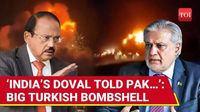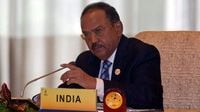Amid escalating tensions between India and Pakistan following India's recent military operation, significant diplomatic communications have emerged between the two nations' National Security Advisors (NSAs). Pakistan's Deputy Prime Minister and Foreign Minister Ishaq Dar confirmed in an interview with TRT World that a conversation took place between Pakistan's NSA, Lieutenant General Asim Malik, and his Indian counterpart, Ajit Doval. This revelation comes in the wake of India's 'Operation Sindoor', which targeted nine locations in Pakistan and Pakistan-occupied Kashmir, aiming to strike at key leaders of the militant groups Jaish-e-Mohammed and Lashkar-e-Taiba, both of which have been implicated in orchestrating terror attacks against India.
While the details of the conversation between the NSAs remain sparse, the acknowledgment of direct communication suggests a potential channel for dialogue exists even amidst the current volatile situation. The Indian Express reported that although the militaries of both nations are in a face-off, diplomatic channels remain open, albeit in a crisis mode. The Indian charge d’affaires in Islamabad, Geetika Srivastava, has been actively engaging with key interlocutors in Pakistan, particularly after she was summoned by the Pakistan Foreign Ministry to address concerns over the Indian strikes.
The recent military operation by India has drawn international attention, with US NSA and Secretary of State Marco Rubio reportedly having spoken to Doval following the strikes. This communication underscores the broader geopolitical implications of the ongoing tensions, with various nations closely monitoring the situation. A senior Indian official downplayed the significance of the contact between the two NSAs, stating, "Being in touch doesn’t mean being in talks." Such remarks indicate that while there may be communication, the nature of these discussions remains limited.
In the aftermath of the strikes, Doval has reportedly briefed his international counterparts, emphasizing that India does not intend to escalate tensions but is prepared to "retaliate resolutely" if provoked. This statement reflects India's strategic posture in the face of ongoing threats from militant groups operating from Pakistani territory. Doval's communications included discussions with officials from the US, China, the UK, Russia, and Saudi Arabia, highlighting the global dimension of the conflict.
On the ground, the situation remains tense. The Indian military has continued to target air defense systems in Pakistan, effectively damaging its military capabilities. Reports indicate that Indian forces have successfully taken out an air defense system in Lahore, further heightening the stakes in this already fraught relationship.
As tensions simmer, the international community, including the United Nations, has expressed alarm over the potential for escalation. UN Secretary-General António Guterres has called for restraint from both sides, urging them to engage in dialogue to prevent further deterioration of the situation. The call for dialogue resonates with security experts who argue that any talks between the NSAs could be beneficial, provided Pakistan takes decisive action against terrorist organizations based on its soil.
Brigadier BK Khanna, a renowned security expert, remarked, "Talk and terrorism can’t go side by side. If Pakistan wants to resume talks, it should take strong action against terrorist organizations and the terrorist leaders." His comments reflect a broader sentiment within India that emphasizes the need for concrete actions against terrorism as a prerequisite for meaningful dialogue.
Despite the complexities, the acknowledgment of communication between the NSAs could be seen as a glimmer of hope for de-escalation. The fact that high-level officials are willing to engage, even in a limited capacity, indicates a recognition of the risks involved in further military confrontation. Yet, the path to peace remains fraught with challenges, particularly given the recent history of hostility and mutual distrust.
As the situation develops, both nations appear to be navigating a precarious balance between military readiness and diplomatic engagement. The ongoing dialogue, albeit strained, may provide a necessary framework for addressing the underlying issues that have perpetuated conflict in the region.
In conclusion, while the potential for de-escalation exists through the communication channels established between the NSAs, it is contingent upon both sides taking meaningful steps towards addressing the root causes of their longstanding tensions. The international community's role in facilitating dialogue and encouraging constructive engagement will be crucial in the coming days as both nations grapple with the implications of their actions.



